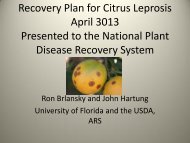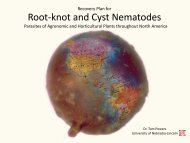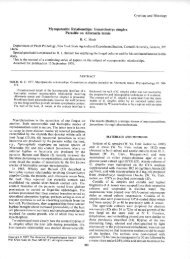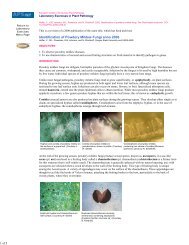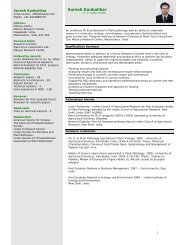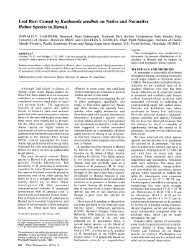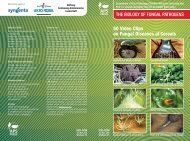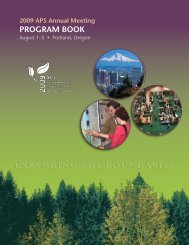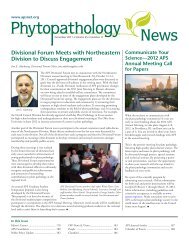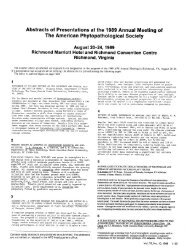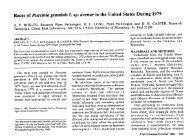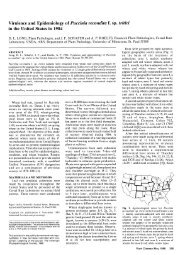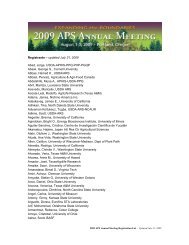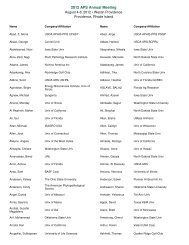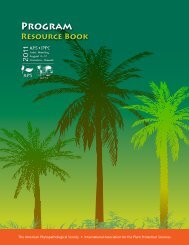See the program book (PDF) - American Phytopathological Society
See the program book (PDF) - American Phytopathological Society
See the program book (PDF) - American Phytopathological Society
Create successful ePaper yourself
Turn your PDF publications into a flip-book with our unique Google optimized e-Paper software.
W elcome to <strong>the</strong><br />
APS CentenniAl Meeting!<br />
We are thrilled to be here in Minneapolis-St. Paul to celebrate<br />
The <strong>American</strong> <strong>Phytopathological</strong> <strong>Society</strong> and honored to have a<br />
record number of past APS presidents and leaders here to help us<br />
commemorate our Centennial.<br />
The 2008 APS Centennial Meeting highlights <strong>the</strong> key developments<br />
and discoveries of our first 100 years and offers a dynamic look into<br />
<strong>the</strong> future of our science. You will have many remarkable opportunities<br />
over <strong>the</strong> next several days to participate in technical, societal, and<br />
social activities. We encourage you to take full advantage of your<br />
time here. Get involved on every level – attend social ga<strong>the</strong>rings and<br />
networking events, visit historical and commemorative displays, meet<br />
<strong>the</strong> new generation of plant pathologists and researchers at <strong>the</strong> technical<br />
<strong>program</strong>, and participate in active and lively discussion with world-renowned scientists from our past,<br />
present, and future.<br />
This year’s <strong>program</strong> highlights historical and celebratory Centennial sessions with an expanded plenary<br />
session and a closing plenary luncheon featuring special guest speaker Dr. Lowell Catlett’s highly<br />
entertaining take on Tomorrow’s Agriculture – Six Trends You Can’t Afford to Miss! In addition, an<br />
informative technical <strong>program</strong> features symposia, over 350 oral and poster presentations, special flashand-dash<br />
presentations, and time with poster authors for discussion. There are more abstracts than last<br />
year, plus 27 special sessions covering today’s most interesting and relevant topics, including aflatoxins;<br />
biocontrol in organic crops; education, technology, and international collaboration in plant pathology;<br />
food security; new products and services; and much more.<br />
I would be remiss if I did not thank everyone for <strong>the</strong>ir contributions and willingness to work toge<strong>the</strong>r<br />
in order to mark <strong>the</strong> occasion of APS’s first 100 years with this memorable tribute. Special kudos go to<br />
<strong>the</strong> Centennial Planning Committee, <strong>the</strong> many volunteers who donated to <strong>the</strong> historical pieces, and<br />
<strong>the</strong> Scientific Program Board (SPB) for <strong>the</strong>ir tireless efforts in forging all of <strong>the</strong> contributions into a<br />
<strong>program</strong>.<br />
Finally, this annual meeting represents a unique opportunity for us to come toge<strong>the</strong>r, to share <strong>the</strong><br />
work we are all doing individually and around <strong>the</strong> world, to learn from each o<strong>the</strong>r in a stimulating and<br />
challenging environment, and to celebrate all that went on before we were here. We are extremely proud<br />
of what we’ve become and <strong>the</strong> potential that exists for plant pathology thanks to <strong>the</strong> contributions of<br />
APS and its members.<br />
James Moyer<br />
APS 2008 Program Chair and President-Elect<br />
1



